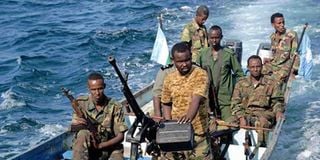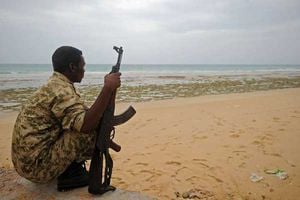
The Somali coast guard on patrol in the sea.
Talks between Somalia and Ethiopia meant to lower their tensions over a controversial MoU for Addis Ababa’s sea access via Somaliland failed this week in Turkey. But, that failure itself is being seen as a success of diplomacy over the risk of direct confrontation or war.
Turkey took up a mediation role in the capital Ankara between Somalia and Ethiopia, two Horn of Africa states that have been at loggerheads since January 1, this year, over a controversial MoU.
Turkish Foreign Minister Hakan Fidan, authorised by President Recep Tayyip Erdoğan, sought to reduce the tension that arose from Somali leaders getting upset when Ethiopia’s Prime Minister Dr Abiy Ahmed signed a Memorandum of Understanding (MoU) with Muse Bihi, the president of Somaliland, a breakaway region of Somalia.
After the talks on Tuesday, both sides said they had not achieved a solution. Some experts, however, think the fact that Somalia and Ethiopia responded to the call for dialogue was a signal that a solution could be found in future, dissuading the two from breaking down their relations completely.
“If anything, the stalled talks in Turkey indicate that neither Somalia nor Ethiopia is currently rushing into direct confrontation,” said Dr Adam Aw Hirsi, Director of Mogadishu-based Think-tank Foresight for Practical Solutions.
“Ethiopia lacks legal standing, and Somalia lacks the wherewithal,” he told The EastAfrican.
Somalia sent a full representation led by its Foreign Minister Ahmed Moalim Fiqi, same to Ethiopia which sent Foreign Minister Taye Atske Selassie to engage in indirect talks.
Turkey succeeded in gathering the two sides where Kenya and Qatar had failed in the past.
Ethiopia had reportedly asked for Kenya and Qatar to mediate and arrange a face-to-face meeting to iron out differences. But, progress was not made after Somalia first conditioned such a meeting to Ethiopia annulling the MoU it signed with Somaliland that was to lease 20 km of coastal strip in exchange for recognition of the breakaway administration.
Turkey, Aw Hirsi cautioned, may have moved the two closer. However, the initiative to address the dispute will depend on the two countries' political will.
“For an amicable resolution, Ethiopia must officially step back from the brink, and Somalia should refrain from involving distant countries in a conflict that the region can ill afford,” he said.
Somaliland had declared secession from the rest of Somalia in 1991 after the collapse of Siad Barre’s regime. But no country has offered recognition. Somalia maintains Somaliland is still part of its territory. Somaliland leader Muse Bihi had hoped that recognition from Ethiopia will lure other nations to do the same.
But Somalia has fought that possibility on the international stage, and at home. Right from January 2 of this year, the day after the signing of the controversial MoU, Somali President Hassan Sheikh Mohamud addressed his country’s bicameral parliament, condemning Ethiopia’s deal with Somaliland, saying it was a blatant violation of Somalia’s sovereignty and international law.
“Ethiopia establishing a naval base and a commercial port is both illegal and unenforceable,” said Mohamud at the time.
Such has remained the position of Somalia while Ethiopia, arguably the most populous landlocked country in the world, maintained that the deal would allow its over 120 million population access to the Red Sea via Somaliland territory.
The exact location of the coastal area to be leased is not known and the MoU has never been publicised. Ethiopia had in the past ran into a dispute with Somalia after entering port deals with Somaliland and an Emirati firm.
However, the then administration of Mohamed Farmaajo later agreed on a joint development of four ports in Somalia. This project was never implemented.
Adan Ismael, a senior researcher in Hargeisa, Somaliland, told The EastAfrican that the talks between Somalia and Ethiopia are also likely to be affected by political events in Somaliland, which plans elections later this year in November.
“The terms of the MoU in question per se are not clear and have never been tabled at the legislative chambers for consideration,” he added.
It is unclear, for now, whether the MoU itself is a political weapon for Bihi because he has only defended it, but never given timelines on implementation.
For Ethiopia, sea access is now a national security issue, PM Abiy has said many times. In the past, he threatened war but had changed his tone over the last year, promising to use diplomacy to seek sea routes from neighbouring countries.
Mogadishu had said it had no problem granting that, as long as the deal was entered legally.
In Ankara, Fidan and other Turkish officials kept on shuttling from one delegation to the other over two days to find a breakthrough. They couldn’t get it.
“The parties converged on some major principles,” he added, recalling that the first round of talks took place in early July, paving the way for the second. He didn’t specify the issues.
He instead called for further talks to build on what is achieved so far, deliberately avoiding exposing the seemingly unsurpassable challenges.
As a major stakeholder in the Red Sea issue, Bihi, meanwhile, spoke for Somaliland on Monday, ahead of the opening of the talks in Ankara.
“Somaliland will never accept the port deal (between Ethiopia and Somaliland) realised via Hassan Sheikh Mohamud (Somalia’s president),” remarked Bihi while campaigning in Berbera, the region’s main seaport.
Ismael argued that for Ethiopia, it is not easy to enter a deal on one day and bow to pressure, repealing it the next day. Both sides, he argued, have political appendages to the deal, making it both a local and regional issue.
Somalia’s position was summed up by FM Fiqi, stating on X (formerly Twitter), “Somalia’s position is never to accept what is known as Ku Qabso Ku Qadi Mayside (Just claim, you are likely to get a share).” The expression used by Fiqi had become very popular during the civil war in Somalia as people made all sorts of claims on others’ properties to attain a stake.
Some Somalis have become sympathetic to Ethiopia’s position, however. But urged fair play.
A group of concerned citizens led Dr Suleiman Walhad circulated an advisory letter, openly stating, “Ethiopia of today has a large population and needs to grow economically. But, the process of development cannot be achieved through wrong and painful actions.”
Somalia, meanwhile, has found itself in a series of bilateral defence cooperation deals it feels will make its case against Ethiopia stronger. It has those separate bilaterals the UAE, Saudi Arabia, Ethiopia, USA, Turkey, Uganda, Eritrea and lately with Egypt.
At the signing ceremony of a Defence and Security Cooperation Agreement in Cairo on Thursday, August 15, Somali President Mohamud stated, “This pact lays the foundation for closer collaboration between our defence and security ministries, essential for the stability of our region.”
The Egyptian President Abdel Fattah El-Sisi reiterated, “Egypt stands firmly against any interference in Somalia’s internal affairs.”
He added, “We are committed to supporting our brothers in Somalia in defending their sovereignty.”
A strange turn of political positions, it was only six years ago that hitherto Somalia President Mohamed Abdullahi Farmaajo welcomed Ethiopia’s PM Abiy Ahmed at Villa Somalia, the statehouse in Mogadishu, in June 2018.
The two leaders issued a joint statement of pledges to cooperate on everything from the development of infrastructure including jointly investing in four seaports, and roads linking the two countries to expanding visa services to promote cultural exchanges.
Additional reporting by Aggrey Mutambo







